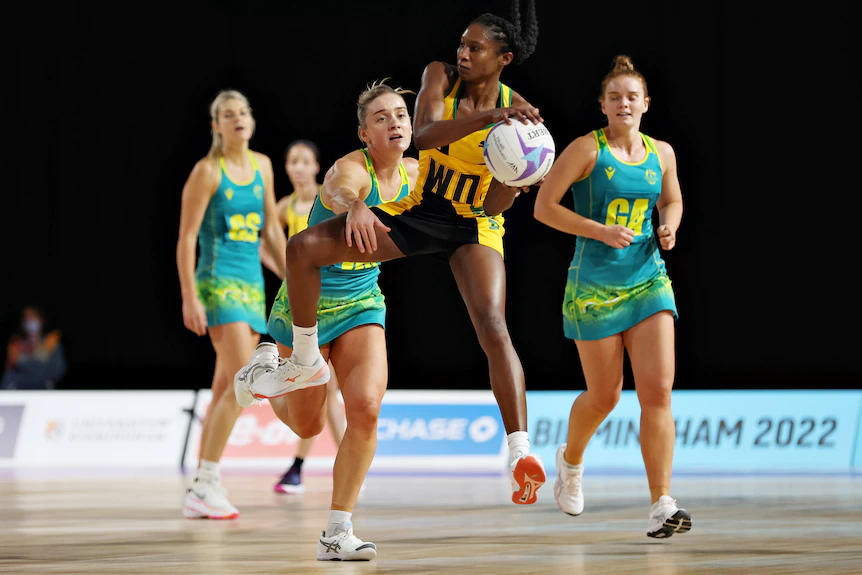It is the middle of the European winter, and sprinter Evan O’Hanlon is shovelling snow off a track in the Czech Republic, where he lives, so he can train in -8C weather.
The Australian four-time Paralympian has no coach by his side, his long-time mentor Iryna Dvoskina coaches him by correspondence.
But he just keeps on running – he does not know how to stop.
“I guess one way to explain it is I’m a problem gambler, and I like coming out here and gambling two years of funding on 11 seconds of running,” he said after winning the men’s T37/38 100m at the Commonwealth Games.
O’Hanlon’s career could have ended two years ago after he broke his foot badly.
Not only did he defy his doctor’s expectations to run again, he also embarked on a new mission to represent Australia at this year’s Beijing Winter Olympics in bobsled.
While he just missed out on qualification for the two-man event, he was determined to come back to the Commonwealth Games, and his persistence has been vindicated.
“It’s really nice, mostly because I could do it in front of my four-year-old daughter and my two-year-old son, Ursula and Alfred,” he said.
“All my other medals they were probably a bit too young for, and in Tokyo they didn’t get to come over because of COVID. So I’ve hung on long enough they’ve been able to come and watch, and that’s pretty special.”
The five-time Paralympic champion wants to keep running and maybe give bobsled another shot too — but he has to be realistic.
“I know if I was right training at the same level I was before London and Rio, I feel like I could win gold again in Paris,” he said.
“But I’ve got to be able to look after my family as well. I’m on the top level of [funding] support in Australia and I moved to the Czech Republic [with Czech wife Zuzana] so that I can afford to keep running.
“I can’t afford to do it if I’m living in Australia on that funding.”
O’Hanlon said his wife would have the final say over whether he continues in one or both sports, but you get the sense he is not done just yet.
Starc pushes through pain barrier for silver Brandon Starc was happy to finish with silver, behind the gold medallist from New Zealand, Hamish Kerr.(Getty: David Ramos Every step Brandon Starc took in the men’s high jump final was agony.
He is still recovering from a bruised heel that forced him to withdraw from the recent world championships.
And while he had to produce more jumps than he would have liked in the final, he was relieved to get a reward.
Starc and New Zealand’s Hamish Kerr both cleared 2.25m on their first attempts, but neither could get past 2.28m, so Kerr won on countback.
“That was probably the toughest comp I’ve ever had,” Starc said.
“Throughout that comp, besides maybe the first jump, I was feeling every bit of that bruised heel. [I] was taking my shoe off trying to get some sort of relief.
“But really, I just had to kind of grit my teeth and jump through it.
“I could have either just rolled over and gave up or pushed through it and tried to do something.”
It was a satisfying medal for the defending champion, and he soaked up the silver with his nine-month-old son Oliver, carrying him all around Alexander Stadium for a lap of honour.
Browning misses 100m podium Rohan Browning (left) was just 0.18 seconds behind the winner, Ferdinand Omanyala.(AP: Alastair Grant Rohan Browning was sixth in the men’s 100m final, finishing just 0.06 of a second off third spot.
The African champion, Kenya’s Ferdinand Omanyala, won in 10.02 seconds.
Browning almost did not even make it to Birmingham.
After underperforming at the world championships a few weeks ago, he considered withdrawing from the rest of the season to return home and get back to training.
“A month ago, there’s no way I saw myself in this final, so I try to take each win,” he said after the race.
“But once you’re here, you just want to be on that podium. That’s what it’s all about.”
Browning has been on a journey to refine his technique and improve his start since his breakthrough performance in winning his heat at last year’s Tokyo Olympics.
And while he conceded he was not where he wanted to be, he was optimistic the results would soon come.
“I’m glad I decided to persist. I just think one of the lessons I’ve learned is persistence is so much more important than patience, you just gotta keep trying things and keep at it. And eventually the tide will turn,” he said.
Jamaica’s Olympic champion Elaine Thompson-Herah lived up to the hype and won the women’s 100m.
Fantastic finish in 10,000m One of the most spine-tingling moments of night six came in the finale to the women’s 10,000m.
After half an hour of racing, it turned into a sprint finish between Scotland’s Eilish McColgan and Kenya’s Irine Chepet Cheptai.
On the final lap, the fans stood up and channelled all their energy towards the Scot, furiously screaming, urging her to find something extra.
And she pulled it off on the home stretch.
“I knew the Kenyans were super strong and would put in bursts. But you can see in that last 100 that I wanted gold. It is an absolute dream. It is so special to have it here in the UK,” she said.
It is the third Commonwealth Games gold in the event for the McColgan family — Eilish’s mum Liz won the event in 1986 and 1990, and now coaches her daughter.
“She ran the race the way I knew she was capable of,” Liz said.
“It has been a long time coming and I know all the hard work she does. It is great that it all came together.”






